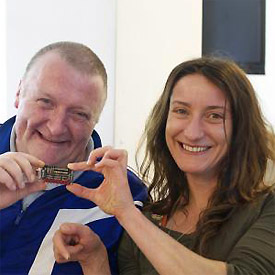Recent Stories
- Businesses urged to tap into science and technology young talent
- Digital relay baton enables remote crowd cheering of athletes
- Health Innovation Campus moves a step closer
- £7.1 million R&D boost for North West businesses
- Centre of excellence created for the next industrial revolution
- Artificial intelligence toolkit spots new child sexual abuse media online
- Strategic partnership set to help plug cyber security skills gap
- What your choice of smartphone says about you
- InfoLabTree: Discover the Story
- novi.digital Launch Event - 'An Event to Help Businesses Grow Online'
RSS Feeds
RSS feeds can deliver the latest InfoLab21 news and events direct to your browser without you having to visit the website.
In most browsers you can click on an RSS link and choose to subscribe to the feed to add it to your favourites or bookmarks.
Homeless health check prototype to be launched
Story supplied by LU Press Office
 the system is based on cheap technology including the credit-card sized Raspberry PI computer
the system is based on cheap technology including the credit-card sized Raspberry PI computer
Homeless people who have been working with Lancaster University academics and citizen scientists to dream up new technology have developed a prototype which could improve their lives.
The device - called 'Pat' or Personal Appointment Ticketing service - enables homeless people living chaotic lives to easily keep track of appointments from doctors and dentists to meetings with social workers with the single swipe of a specially-made wrist band or plastic card. It then prints out a personalised reminder list of dates, times and places.
Based on simple, cheap technology including a Raspberry PI computer, the system is now being tested by case workers and service users from Signposts, a charity supporting homeless groups in Lancashire and Cumbria, who played a key role in developing the prototype.
It will be launched on November 28 at The Midland Hotel, Morecambe (register to attend). Attendees will be able to hear more about the project and see the prototype in action.
The prototype was developed as part of an eight-month research project called Patchworks led by Lancaster University working in collaboration with Signposts and MadLab - a group of DIYBio innovators who share and experiment with cheap, open source technology.
The project is part of an ambitious £1.9m Engineering and Physical Sciences Research Council project called Catalyst, led by Professor Jon Whittle of Lancaster's School of Computing and Communications. Catalyst will be made up of series of short research 'sprints' designed to test the boundaries of existing communications technology and empower groups to change the world for the better. Patchworks is Catalyst's first project.
Medical biologist Dr Rod Dillon, who is leading Patchworks, said: "Unlike other projects of this kind, Patchworks depends on the imaginations, experiences, design and manufacturing skills of homeless communities themselves. We are not telling people what we can do for them, we are asking what they need and working with them to create it.
"We hope this tool will help people make more appointments because they have access to a different type of reminder system, and lead to improvement in quality of life.
"Indirectly, through taking part in the Patchworks prototype development process, Signposts staff and clients have increased awareness of technologies and how they work. They have also made new connections which we hope will continue, enabling them to make improvements in their lives and the services they provide and receive."
Sharon Calverley, Project Director at Signposts, said: "Patchworks is a really exciting initiative - there is amazing potential for the technical side of this project to make a real difference to homeless people.
"What makes it really brilliant is the idea of two groups from very different backgrounds working together for the benefit of a marginalised section of the local community.
"For me the most rewarding thing was when we brought one of our service users back from MadLab in Manchester and he said 'there's such a big world out there and I'm wasting my life and I need to do something'. To me that sums up what we are about."
Thu 22 November 2012



